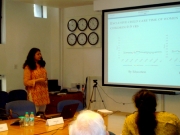Do Mothers have Enough Time to feed their Children?: Effect of Maternal Time use on Child Nutrition in Bangladesh
07 May 2015
Past Event

By accounting for seasonality, income, and education, Dr Monica Jain’s research reveals some of the factors that constrain women’s time use – and some surprising factors that don’t – to understand what may shape women’s ability to provide adequate complementary feeding.
Complementary child feeding practices that complement breast feeding are poor in Bangladesh and have improved minimally over time, especially for children 6-23 months. One hypothesis frequently proposed is that mothers in Bangladesh do not have enough time for adequate complementary feeding. We test this using panel data on time use of women across three agricultural seasons in 1996-97. We find that women spend around two hours a day on exclusive child care, which does not vary significantly by income, education or agricultural season although boys are favored. In the higher intensity agricultural season the majority of women reduce their time spent on cooking. Women also combine child care with their other work for more than two hours every day; the extent of multi-tasking does not differ by education level or the gender composition of children. Married women 15-49 years old themselves eat less when they spend less time on cooking, and the effect is stronger for those with children under 5 years. For the male head in these households the effect is smaller in magnitude and less robust. Women’s cooking time does not affect the food consumption of their children either 6-23 or 24-59 months old, but there is some evidence of discrimination in favor of boys. Exclusive child care time has no effect on food consumption of children 6-23 months old, but there is some evidence of a negative effect on food consumption of children 24-59 months and on girls. Multi-tasking child care time has no consistent effect on food intake of children either by age or gender. Maternal time on work outside home has a positive effect on their own food consumption and somewhat on their sons’ food consumption.
Time use is one of many drivers of poor complementary feeding practices. Knowledge, income, and access to the right kinds of foods also influence complementary feeding.
Monica Jain is an Associate Research Fellow at the International Food Policy Research Institute in Washington, D.C. Her research focuses on poverty and development issues including health and nutrition, labor, education, and governance. She has previously worked at The World Bank, New Delhi, and interned at The Brookings Institution in Washington DC. She has a PhD in Economics from the University of California, Riverside, and an MPhil and Master’s in Economics from the Delhi School of Economics.










